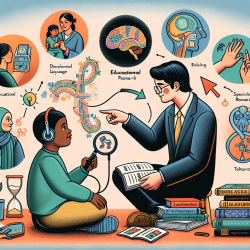In the realm of speech-language pathology, particularly when focusing on child outcomes, leveraging data-driven decisions and empirical research is crucial. One notable study that offers significant insights is "The SENSE Study (Sleep and Education: learning New Skills Early): a community cognitive-behavioural therapy and mindfulness-based sleep intervention to prevent depression and improve cardiac health in adolescence." This blog will explore how practitioners can implement the findings of this study to enhance their therapeutic approaches and encourage further research in this vital area.
The SENSE Study: An Overview
The SENSE Study was designed to test the efficacy of a sleep improvement intervention in preventing depression and enhancing cardiovascular health among adolescents. Conducted as a longitudinal randomized controlled trial (RCT) across Victorian Secondary Schools in Melbourne, Australia, the study targeted adolescents aged 12–17 years who were identified as at-risk for depression due to high levels of anxiety and sleep problems.
Key Findings and Their Implications
The SENSE Study revealed several critical outcomes that can be transformative when applied in therapeutic settings:
- Improved Sleep Quality: Adolescents who participated in the sleep intervention showed significant improvements in both subjective and objective measures of sleep quality. This highlights the importance of incorporating sleep hygiene and cognitive-behavioral strategies in therapeutic practices.
- Reduced Anxiety and Depression: The intervention not only improved sleep but also led to a decrease in anxiety and mood symptoms. This suggests that addressing sleep issues can have a broader impact on mental health, making it a valuable component of therapy for at-risk youth.
- Enhanced Cardiovascular Health: Participants also exhibited better cardiovascular health markers at the two-year follow-up. This underscores the interconnectedness of mental and physical health and the potential long-term benefits of early intervention.
Practical Applications for Practitioners
Practitioners can draw several actionable strategies from The SENSE Study:
- Integrate Sleep Interventions: Incorporate sleep hygiene education and cognitive-behavioral strategies into therapy sessions. Techniques such as mindfulness and relaxation exercises can be particularly effective.
- Monitor and Evaluate: Use sleep diaries and actigraphy to monitor sleep patterns and evaluate the effectiveness of interventions. This data-driven approach ensures that interventions are tailored to individual needs.
- Holistic Approach: Recognize the interplay between sleep, mental health, and physical health. A holistic approach that addresses all these aspects can lead to more comprehensive and lasting improvements.
Encouraging Further Research
While The SENSE Study provides a robust foundation, there is always room for further research. Practitioners are encouraged to:
- Conduct Follow-Up Studies: Implement similar interventions in different settings and populations to validate and expand upon the findings.
- Explore Additional Variables: Investigate other factors that may influence the effectiveness of sleep interventions, such as socioeconomic status, family dynamics, and cultural differences.
- Collaborate and Share: Collaborate with researchers and other practitioners to share insights and develop best practices. This collaborative approach can accelerate the adoption of effective interventions.
By integrating the findings of The SENSE Study into their practice, speech-language pathologists can significantly enhance outcomes for children. To read the original research paper, please follow this link: The SENSE Study (Sleep and Education: learning New Skills Early): a community cognitive-behavioural therapy and mindfulness-based sleep intervention to prevent depression and improve cardiac health in adolescence.










